- Home
- slideshows
- miscellaneous
- A day with YouTube prankster Adam Saleh proved that the internet's A-listers have reached celebrity status
A day with YouTube prankster Adam Saleh proved that the internet's A-listers have reached celebrity status
Unlike many YouTubers who have made their way out to Los Angeles, Adam Saleh is based outside of New York City and close to his family. His manager, Chas Stahl, is based on the West Coast, but I met up with the duo on a week Stahl was in town.

The biggest task on Saleh's schedule is a recording session at the New York offices for Spotify. Through Spotify and its recording app Anchor, Saleh and other creators are given access to recording space and equipment for podcasts in exchange for including a few ads.

Saleh's latest addition to his brand has been creating a podcast. It's recently been a popular choice for creators: Notable YouTubers like Logan Paul, Emma Chamberlain, and David Dobrik all host their own podcast shows, where they often invite on their internet-famous friends and offer fans further behind-the-scenes glimpses into their lives.
Saleh echoes this sentiment for what he wants for his own podcast.
"There's no agenda. We're just winging things," Saleh said. "We want the podcast to be stuff we can't say on YouTube and Twitter."
We're brought to a recording booth on the 62nd floor of Spotify's offices, which comprise 14 floors of the building (and have free food for employees on seven of those floors). A Spotify liaison walks Staleh and Stahl through instructions for how to record audio and use the high-tech equipment around the room.

When Spotify purchased Anchor in 2019, the two companies lauded the acquisition as a way to "democratize" audio and make podcast creation a possibility for more users. As part of this, creators like Saleh are given essentially free access to Spotify's expensive recording equipment and Anchor's app, where you can read scripts, and control and edit audio recordings.
All that Saleh has to do for this access is include a few shout-outs to Spotify and Anchor in his podcasts. In addition to recording a couple ads, Saleh is trying to record a trailer for the podcast and two episodes, to make sure there's enough content for the podcast's eventual release in March.
Stahl is there to coach Saleh through his lines, and silently hold up messages on his phone made in the iOS Notes app that remind him to record shoutouts to his YouTube channel and other social accounts. Stahl acknowledges that there's a lot of "handholding" behind the team's first podcast, but he won't be there after he flies back out to Los Angeles.
However, there's one problem: The partner that Saleh records his videos and content with, Slim Albaher, is late. It'll be 50 minutes before he shows up.
Saleh and fellow YouTuber, Slim Albaher, are hosting the podcast together. The podcast, called "Socially Profiled," comes out in March.
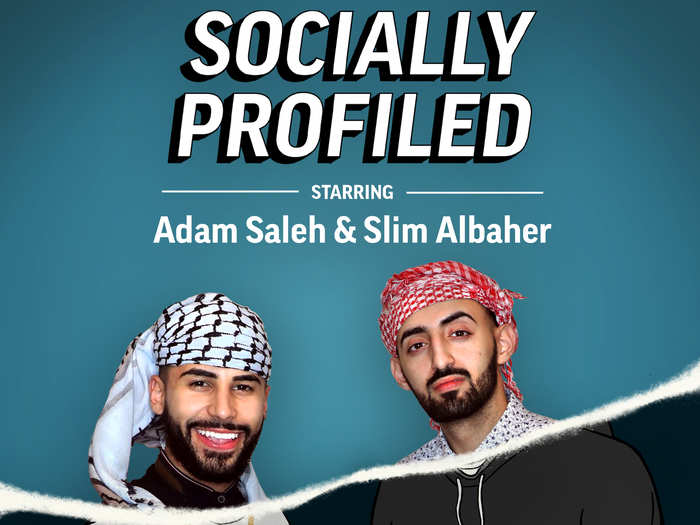
Listen to the trailer for "Socially Profiled" on Spotify.
Saleh and Albaher have been friends since childhood, and have been recording videos on YouTube together since 2012. Although Saleh may have more name recognition, his content often thrives on the friendship and back-and-forth between the duo.
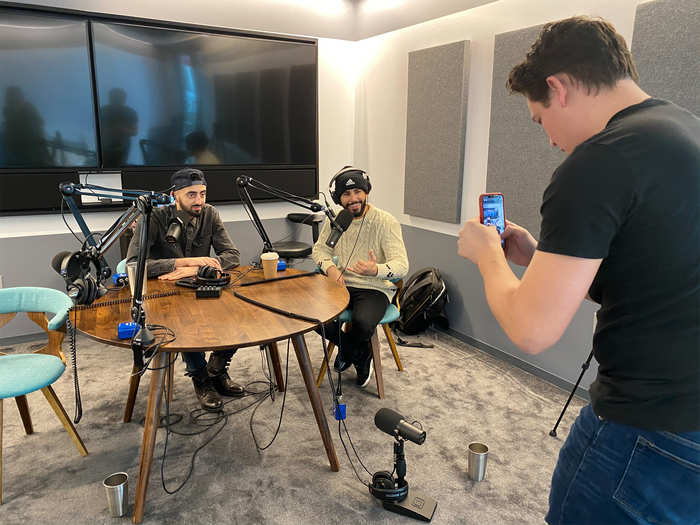
Albaher's lateness to the podcasting session doesn't seem to phase Saleh and his manager. Saleh says they they jokingly refer to him as "Grandma Slim" because of how often he's late to meet up with him.
Albaher and Saleh grew up together in Brooklyn, so coming together to jointly make YouTube videos made sense to the two friends, Saleh said.
"We're from the same city, same country," Saleh said. "Why not work together?"
After high school, both Saleh and Albaher found their paths once again aligned. After Saleh dropped out of college — first one year at a New York City community college, then one year at John Jay College of Criminal Justice — he found that Albaher had done the same. The pair decided to pursue YouTube full-time.
Saleh and Albaher spend a lot of time walking around, waiting for a video idea or skit to emerge unplanned. They say that some of their best content has been created this way.
For the podcast, Saleh and Albaher invited on Sadam Ali, a professional boxer whose family is also from Yemen. Like many YouTubers, Saleh and Albaher have starting pursuing boxing careers — and have employed Ali as their trainer.
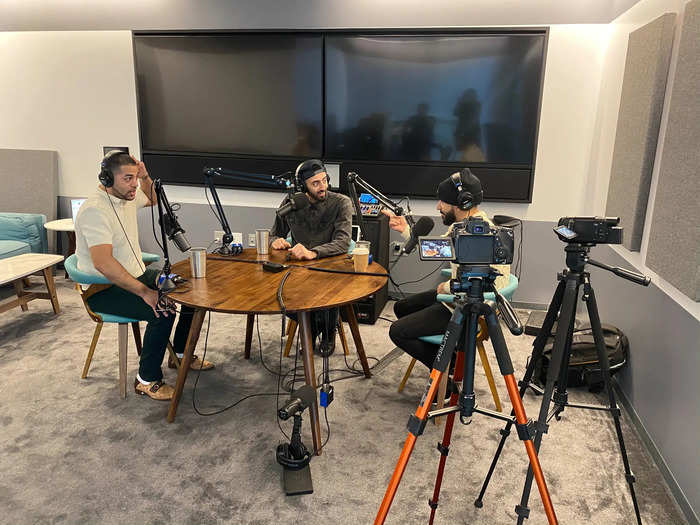
Saleh's connection to Ali traces back to the YouTuber's childhood (they later found out they lived two block from each other). Saleh was a bagger at a local grocery store in Brooklyn as a kid, when Ali passed by the store one day. Ali was already a well-known name, making the rounds as a championship fighter and Olympics hopeful.
Saleh proceeded to leave work to run down the street and get a picture with Ali.
"You were an idol to us young Yemeni kids," Saleh told Ali on the podcast.
As the three chat and record for the podcast, Stahl gets up to offer silent feedback when necessary, and adjust the camcorders set up in the corner. The two video cameras are set up on tripods to catch visuals for the podcast, which can later be posted on YouTube to get in front of the eyes and ears of more viewers.
Unlike other amateur YouTuber-turned-fighters, Saleh has a background in boxing. He started fighting at the age of 11, but has only recently returned to the pro boxing arena. He's taking training seriously, and says he's at the gym with his trainer three or four times a week.
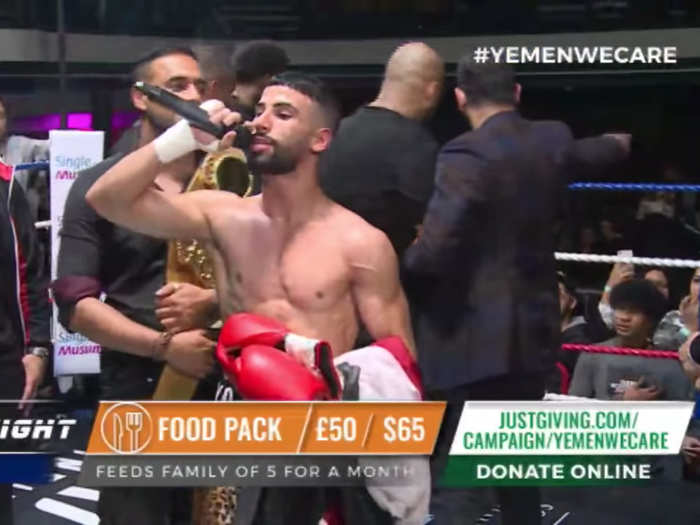
"You're not really fighters, but you took training seriously," Ali, Saleh's trainer, said. "Who ever thought Youtubers would be at this level of boxing?
Saleh's fighting license was revoked as a teen after a video surfaced of him fighting on the street, the YouTuber said. However, he recently got his fighting license back in the United Kingdom, allowing his to again get in the ring.
In his first fight back, Saleh was the headlining match in a charity event to raise money for Yemen. The event raised $400,000.
After recording the podcast, we head to grab lunch at a nearby Chipotle. As we eat, Saleh pulls out his computer to upload content to YouTube and to ensure it's been cross-posted to his other social media accounts.
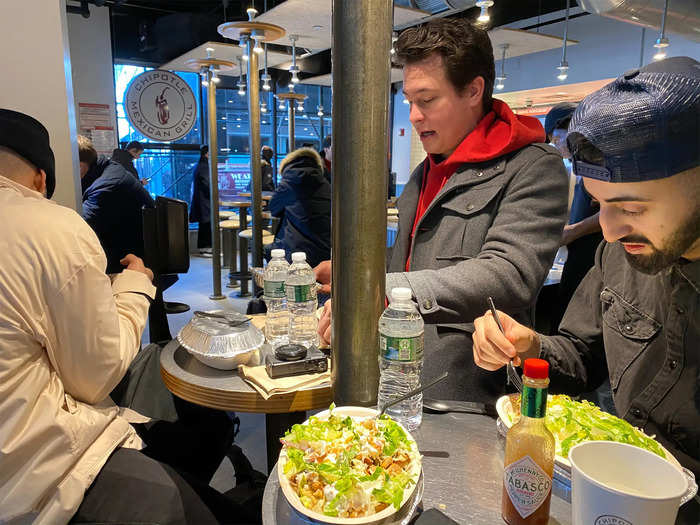
YouTube is where Saleh got his start, and it remains the central stream of revenue of him. He's since developed fan bases on his Snapchat, Instagram, and Twitter accounts, but his income regularly stems from YouTube.
Saleh grew up watching YouTubers like NigaHiga, and Jesse Wellens and Jeana Smith, who ran an account called "Prank vs Prank." That channel is what gave Saleh inspiration to make his own videos featuring pranks and public skits.
It's one of those public pranks that first gave Saleh some fame. Back in 2012, talk show host Ellen DeGeneres called for submissions to her dance dare challenge, encouraging viewers to submit videos in which they dance in public behind unsuspecting people. Saleh took on the challenge, and submitted his own entry.
Saleh's submission captured the attention of DeGeneres's producers, and they invited him to California to appear on the show. Saleh had a final that day, but he skipped it to appear on "Ellen."
Seemingly overnight, Saleh gained thousands of followers and subscribers. Saleh credits this as the point in which he decided to drop out of college, and pursue YouTube full time.
However, establishing YouTube as a full-time gig comes with all the downsides of running your own business. To help deal with these tasks, Saleh has a full team to help him out: Aside from his manager, he has a few video editors, camera people, and a team at talent management company Fullscreen responsible for his partnerships with YouTube. For his pursuits outside of online video, Saleh also has Ali, his boxing trainer, and a music producer.
At one point, Saleh leaves to take a call with his lawyer. Saleh's income is also privy to taxes, and he's currently being audited by the Internal Revenue Service. He has two accountants to help him with his taxes as well.
After lunch, Saleh pays a favor to his sister and meets up with her friend and family, whose excitement at meeting Saleh is evident. Saleh says he has to avoid certain areas of the city in order to stop from getting bombarded with fans and requests for autographs and pictures.
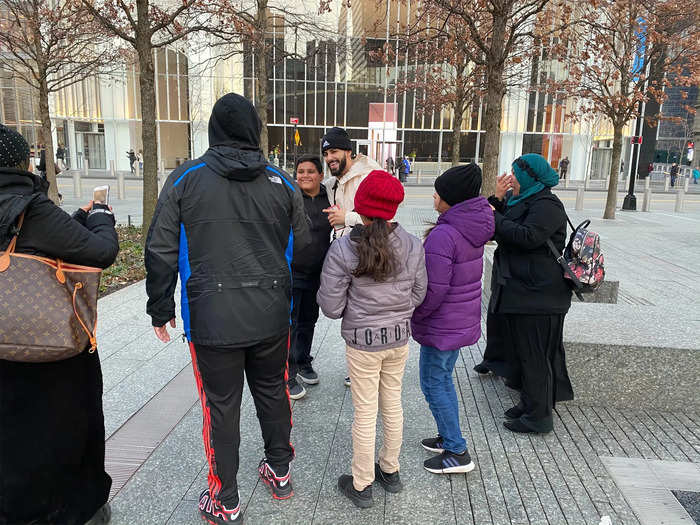
Saleh and Albaher are two of the most popular YouTubers from Yemen. This stature means they're especially worshipped by Yemeni teens, who often come up to him when Saleh goes to Yemeni restaurants or certain neighborhoods in Brooklyn and Queens.
But with more than 7 million YouTube subscribers, Saleh is a celebrity in every sense of the word. We stop in Starbucks for a coffee, and an employee there recognizes him and asks for a selfie.
"There's a point when I started to lay low," Saleh said. "Sometimes we would be filming a prank video, somebody would come up and ask for a picture, and ruin it."
Saleh said he's also had fans show up to his house in Long Island who have traveled from as far as California to try to catch a glimpse of him. Saleh joked, "it's where I shower."
However disruptive the attention, Saleh doesn't hate it. The YouTuber maintains that his No. 1 goal with his work is to brighten people's daily lives, by whatever means necessary.
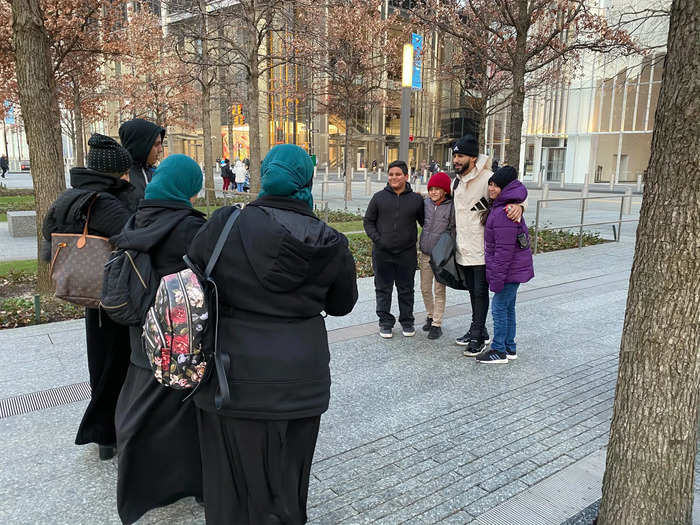
"We want people always listening, always paying attention," Saleh said. "I make videos for people to forget, even if it's for 10 to 15 minutes."
Stahl, Saleh's manager, wouldn't disclose how much money the YouTuber makes, but said he made "six figures" in 2019. Despite that number, Stahl called 2019 a "transition year" in which Saleh participated in several charity events instead of doing work that contributed to his income.
After eight years in the spotlight, Saleh's sources of income have continued to diversify, from simple video uploads and into merchandise and podcasts. This expansion means that Saleh is not just a person, he's an entire brand. Although he was once struggling to gain name recognition, Saleh has reached a level where he can delegate the menial tasks he doesn't enjoy to others, while he focuses on what he loves: being a creator.
Popular Right Now
Popular Keywords
Advertisement